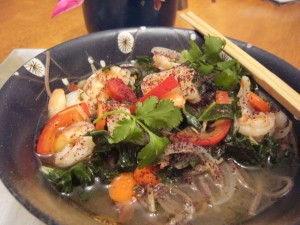Asian Fascination
Note: this is part 2 in a 4 part series – search tag “seasonings” to see all posts.

Asian Noodle Bowl ~ Shrimp & veggies over buckwheat noodles in broth.
Give your next dish an Asian flair with some of the extras listed below or go all out for an authentic tasting, fascinating looking meal by using these basics to inspire your favorites.
Color, texture, and a balance of flavors are what charaterize Asian cuisine and make it so fascinating to prepare and so incredible to sit down to enjoy.
The guide is organized into categories:
Oils: describes typical cooking medium best suited for flavor & typical cooking temperatures.
Sour: this important flavor (often missing in American cuisine) helps stimulate digestion & provide balance to a meal so your body gets the signal that it has been nourished. Add the sour component towards the end of cooking or just before serving to keep it bright & fresh.
Savory: Also known as spicy, boosts metabolisim and keeps things lively!
Herbs & Spices: These are the basics for each cuisine listed. Experiment with them. Generally spices are best added early in cooking & herbs toward the middle to keep their delicate flavor.
Extras: Who doesn’t love extras? Toss these goodies in to add sparkle!
Dairy: Used in moderation, dairy provides richness to your meals.
Nuts: Like extras, nuts add sparkle. They also boost the nutritional value of vegetable dishes by adding a source of protien.
Vegetables: These are classics found in listed cuisines. They will round out a meal and provide important vitamins, minerals, and fiber.
Grains: While rice is universal, quinoa (a high protein grain that is a staple of south american cultures) and buckwheat offer a great change of pace and will make your meal really stand out!
Here are specifics—
OILS: Peanut/Vegetable Oil Sesame Oil
SOUR: Rice Vinegar White Wine Lime Juice
SAUCES: Soy Sauce Fish Sauce Oyster Sauce Hosin Sauce
SAVORY: Ginger Garlic Crushed Red Pepper
HERBS & SPICES: Cilantro Allspice Five Spice Powder Dry Mustard
EXTRAS: Grated Coconut Water Chestnuts Bamboo Shoots Lemon Grass
Black Mushrooms Shitake Mushrooms
NUTS: Cashews Peanuts Sesame Seeds
VEGETABLES: Celery Snow peas Carrot Red Bell Pepper Broccoli Bok Choy
Green Onion Bean Sprouts Watercress Aduki Beans
GRAINS: Jasmine Rice Buckwheat Noodles Egg Noodles
SOME EXAMPLES:
Chicken with vegetables~Season a chicken breast with White Wine, Ground Ginger, and 5 Spice Powder. Grill or pan fry in small amount of Sesame Oil. Thinly Slice Bok Choy (or Napa Cabbage), Celery and shred some Carrot on a box grater and stir fry them all together with Some Garlic and Crushed Red Pepper.
Slice chicken breast into strips and serve over vegetables. Top with crushed Peanuts and minced Green Onion.
Asian Noodle Bowl (pictured above) ~Heat a small amount of Peanut Oil in a medium suacepan and sautee some minced fresh Ginger, Crushed Red Pepper, & chopped Onion, and diced Red Bell Pepper until soft. Add a cup of Chicken broth per serving and some water chestnuts. Cover and bring to a simmer, then add some sliced Shitake Mushrooms or SnowPeas. When ready to serve, add peeled shrimp and cook for just 2-3 minutes.
Place some cooked Buchwheat noodles (known as Soba) and fresh chopped Watercress in individual bowls and pour shrimp, vegetables and broth on top. Season with Rice Vinegar if desired and sprinkle with Seasame Seeds and a drizzle of dark Sesame Oil.
Beef with Broccoli ~ Cook thinly sliced Beef in small amount of oil with minced Fresh Garlic in a large skillet or Wok. Remove from pan and wipe any fat from pan with a paper towel. Add oil to the pan with some Crushed Red Pepper and stir fry steamed Broccoli until tender. Return Beef to the pan, reduce heat and season with Oyster Sauce and Soy Sauce to taste. Top with Sesame Seeds.
Wok on!
 Mediterranean Diet Recipes
Mediterranean Diet Recipes Categories:
Categories:  Tags:
Tags:
Trackbacks / Pingbacks